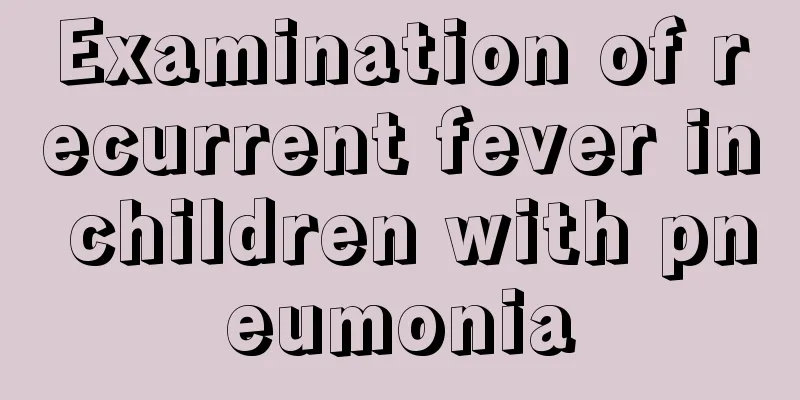How many days will it take for the infantile rash to go away?

|
In daily life, roseola infantum is a relatively common skin disease in children. Children are prone to fever during the period of urticaria. The high fever usually lasts for 3-5 days, or about a week. The time it takes to subside after the skin rash needs to be determined according to the individual's physical condition. It usually subsides in about 5-15 days. Parents need to pay attention to observation in time. How many days will it take for roseola infantum to subside? Roseola infantum, also known as infantile roseola, is a common disease in infants and young children characterized by high fever and rash. Human herpes virus types 6 and 7 infection are the cause of roseola infantum. Roseola infantum often occurs in infants and young children when they are 6-18 months old, and spring and autumn are the peak seasons for roseola infantum. The incubation period of this disease is generally 5-15 days, and its clinical features are high fever for 3-5 days, followed by a sudden drop in fever and the appearance of a rash. The rash is a red maculopapular rash distributed on the face and trunk and can last for 3-4 days. Some children may develop characteristic erythema on the soft palate. The rash does not require special treatment and generally disappears on its own without desquamation or pigmentation. To sum up, the rash of roseola infantum usually subsides after 3-4 days, and roseola infantum does not require special treatment, and only requires enhanced care and treatment during the period. Symptoms of roseola infantum Roseola infantum is mainly characterized by high fever and rash. It is a common viral rash disease in infants and young children. Babies with roseola infantum will suddenly develop a high fever, and their temperature can rise to 40°C or higher within a few hours. After 3-4 days of continuous high fever, the body temperature drops suddenly, and at the same time or later, a light red maculopapular rash will quickly appear on the skin. The rash is mostly scattered and can be seen all over the body, but is less common on the face and distal limbs. The rash disappears quickly within 1-2 days after it appears, leaving no pigmentation or desquamation. Roseola infantum has an incubation period of 1-2 weeks. Before the onset of roseola infantum, the baby is different from usual, looking poorly and listless. The head feels hot when touched and the body temperature is around 38 to 39 degrees. Sometimes symptoms such as a mild cough and a small amount of clear nasal discharge may occur. When the fever reached a high level, the child's mental state returned to normal and systemic symptoms were mild, with only a slight red throat and sometimes a mild cough, but no other obvious signs. However, convulsions may occur in the event of a sudden high fever, so you should be careful. After the fever subsides on the 4th day, the baby will start to develop a rash on his body. Small red rashes like mosquito bites will appear on the baby's chest and back. These rashes will gradually spread at night and even affect the face, neck, hands and feet. At this time, although the baby's fever has subsided, he or she may still be lethargic and cry a lot. On the 3rd or 4th night, your baby may also have loose stools. Generally, full recovery takes place on the 5th or 6th day, when the baby's rash becomes less and his spirit returns to his normal state before the onset of the disease. Only then can it be said that he has recovered. Nursing care for infantile rash Roseola infantum is a self-limiting disease and generally does not require special treatment. Proper care is far more important than giving your baby medication. When caring for roseola infantum, the following aspects should be specifically addressed. 1. When your baby has a fever, go to the hospital first and listen to what the doctor says. Do not give your baby any medicine casually. 2. When caring for your baby, pay attention to feeding him plenty of water and mainly liquid or semi-liquid food to replenish the water lost by the body due to high fever. 3. Give your baby appropriate supplements of vitamin B and vitamin C. 4. Try to avoid taking your baby to outdoor activities as much as possible, pay attention to isolation and avoid cross infection. 5. Keep your baby's skin clean and hygienic, and wipe off the sweat on your baby's body frequently to prevent him from catching a cold. 6. When the baby's body temperature exceeds 39°C, you can wipe the baby's body with warm water or 50% alcohol to prevent the baby from having convulsions due to high fever. 7. Let your baby rest more and ensure that he gets enough sleep, which is conducive to physical recovery. In addition, the room should be quiet, the air should be fresh, and the quilt should not be too thick or too much. |
<<: How to relieve itching of urticaria in children?
>>: How to treat paronychia in children
Recommend
What to do if your newborn has intestinal gas
Intestinal flatulence is a common symptom in newb...
Can babies drink chicken soup? The most important thing is to master the correct way of eating
Chicken soup has a very good nourishing effect on...
Treatment cycle and related treatment methods for neonatal sepsis
The treatment cycle of neonatal sepsis causes our...
What causes bad breath in a three-year-old child?
Bad breath is a very common phenomenon in life. G...
Is childhood epilepsy hereditary?
Epilepsy is a very scary disease. It is a neurolo...
What to do if your child eats a coin
Coins are a very common form of currency in our d...
What are the symptoms of intellectual disability in a 2-year-old baby?
Generally speaking, when babies reach the age of ...
When does a baby start to have constipation?
Constipation is a very common phenomenon among in...
What to do if blisters appear on children's hands
If your hands are burned, blisters can easily for...
What is the intelligence standard for a 5-year-old baby?
Because there was no relevant scientific basis be...
What is duodenal obstruction in newborns?
Many babies will have some problems after they ar...
What should children eat to nourish their brains?
Every parent hopes that their child is smart, esp...
The jaundice will go away in a few days.
Generally speaking, the physiological jaundice of...
What should I do if my baby is bitten by mites?
The health of babies is very fragile, especially ...
Symptoms of pancreatitis in children
As our times become better and better, the food w...









